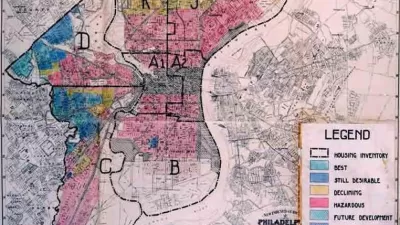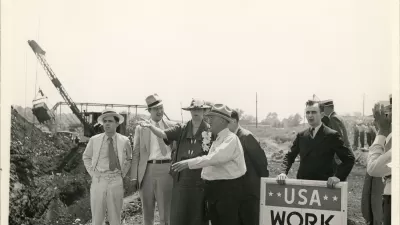As part of a series of articles in The Nation on a New "New Deal", Bill McKibben argues that we need a huge investment of labor and money into green initiatives.
"We usually talk about New Deal programs in terms of their effect on the mood of Americans--they restored hope, they gave people back their dignity and so on. Sometimes we talk about how they helped get the economy afloat again. But there was another result: the hundreds of thousands of actual projects that were built in those years. Hiking trails, city halls, bridges, park gazebos, public plazas, dams, and on and on. For my money, that's the kind of work that needs doing now, as we face a crisis even greater than the Depression: the quick unraveling of the planet's climate system in the face of our endless emissions of carbon dioxide.
Many people have used the Apollo Project (or the Manhattan Project) as the template for how we can quickly wean ourselves off fossil fuels and replace them with renewable sources of energy. That's good as far as it goes--we do need new technologies. But in a sense our task is almost the reverse of the Apollo Project. Instead of focusing our resources to land a few people on the moon, we need to spread them out to affect everyone. It's as if we've got to get the whole nation into orbit, and fast. And for that, the Works Progress Administration (WPA) and the CCC (and the industrial thrust to gear up for World War II) may provide a better analogy.
The people hired by these agencies went out and did things, and did them in large numbers--the CCC planted 3 billion trees (which would be no small help with global warming). Imagine an army of similar size trained to insulate American homes and stick solar photovoltaic panels on their roofs. They could achieve, within a year or two, easily noticeable effects on our energy consumption; our output of carbon dioxide might actually begin to level off. And imagine them laying trolley lines back down in our main cities or helping erect windmills across the plains. All this work would have real payoff--and none of it can be outsourced. You're not sending your house to China so they can stuff it with cellulose."
FULL STORY: A Green Corps

Planetizen Federal Action Tracker
A weekly monitor of how Trump’s orders and actions are impacting planners and planning in America.

Maui's Vacation Rental Debate Turns Ugly
Verbal attacks, misinformation campaigns and fistfights plague a high-stakes debate to convert thousands of vacation rentals into long-term housing.

San Francisco Suspends Traffic Calming Amidst Record Deaths
Citing “a challenging fiscal landscape,” the city will cease the program on the heels of 42 traffic deaths, including 24 pedestrians.

Amtrak Rolls Out New Orleans to Alabama “Mardi Gras” Train
The new service will operate morning and evening departures between Mobile and New Orleans.

The Subversive Car-Free Guide to Trump's Great American Road Trip
Car-free ways to access Chicagoland’s best tourist attractions.

San Antonio and Austin are Fusing Into one Massive Megaregion
The region spanning the two central Texas cities is growing fast, posing challenges for local infrastructure and water supplies.
Urban Design for Planners 1: Software Tools
This six-course series explores essential urban design concepts using open source software and equips planners with the tools they need to participate fully in the urban design process.
Planning for Universal Design
Learn the tools for implementing Universal Design in planning regulations.
Heyer Gruel & Associates PA
JM Goldson LLC
Custer County Colorado
City of Camden Redevelopment Agency
City of Astoria
Transportation Research & Education Center (TREC) at Portland State University
Jefferson Parish Government
Camden Redevelopment Agency
City of Claremont





























